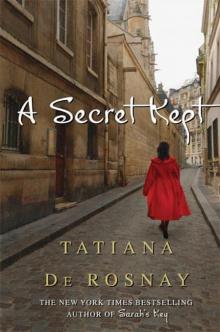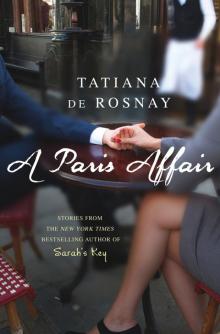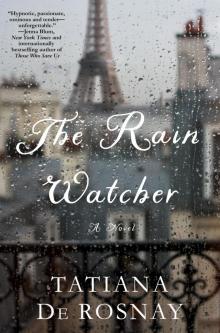- Home
- Tatiana de Rosnay
The Rain Watcher Page 5
The Rain Watcher Read online
Page 5
Linden now turns his Leica toward his mother and sister and clicks away. He loves the different, richer sound an argentic camera makes, the characteristic mechanical whirr of film as it winds itself into its compartment. Most of the jobs he gets today demand digital equipment. He is used to that but will always harbor a soft spot for his old camera. He bought the secondhand Canadian-made Leica M4-P in Paris, at the flea market at Saint-Ouen, in May 1998, for his seventeenth birthday. All his family had contributed toward it, even his grandparents from Boston. It was cheaper than expected, due to a flaw pointed out by the vendor. There was something wrong with the shutter curtain, which tampered with the shots. It would cost even more to have it mended. As soon as Linden took the black camera emblazoned with the label Leitz into his hands, feeling its weight, its sturdy mass against his palms, he knew he had to have it. It was an iconic camera, the one he dreamed of owning. Alfred Eisenstaedt used a Leica to capture that legendary Times Square kiss in 1945; with one, Nick Ut caught the searing horror of napalm in 1972; and Alberto Korda immortalized Che Guevara wearing a beret in 1960 with his. Linden would figure out how to mend it later. His first photos were marred by strange wispy shadows, ghostlike shapes flitting through the image. The size of the shadows grew with the increase in shutter speed, he discovered. For a long time, he found he could not afford to get it repaired. So he learned to work around and with the shadows, which taught him his own technique. The Leica has witnessed much of his life. It was with the Leica that he took the memorable photograph of his father, the one that got him noticed at the age of eighteen, when he was still living with Candice, on rue de l’Église.
He has often told the story of that particular shot. On Sunday, December 26, 1999, the phone rang in the early hours of the morning, at Candy’s. It was Lauren, overjoyed, announcing the birth of Tilia’s baby during the night at the Biarritz clinic. A girl. The customary Christmas at Vénozan had not been held that year, as Tilia went into labor on the twenty-fourth and Lauren had rushed to Biarritz to be with her daughter. Linden had remained with his aunt in Paris, and Paul had come up to be with them. He was staying in a hotel on nearby avenue Félix-Faure. All night long, great winds had blown over Paris, but it wasn’t until Linden opened the shutters after his mother called that he realized something was wrong. The public garden down the road looked like a bomb had hit it. The pavilion used as a summer concert hall had been crushed by a chestnut tree. Branches, flung here and here, were strewn all the way down the street. Linden switched on the television. He learned that a tremendous storm, with the force of a hurricane, had battered France during the night from west to east, leaving depredation in its wake from Brittany to Alsace, searing through Paris and its area. A hundred people died. Electricity was down in over three million homes. The damages were colossal. As Linden watched, mesmerized, his father telephoned. His voice was strangled, unrecognizable. At first, Linden thought there was a problem with Tilia’s baby. His father needed Candy’s car, now, right now. He had to go to Versailles. As quickly as possible. Versailles? Why Versailles? Linden couldn’t understand. He went to ask Candice for the car keys, got dressed, and rushed downstairs to meet his father. His father said nothing as they drove out to Versailles. But Linden began to apprehend the situation when he saw the number of plummeted trees. The highway was closed because of the damage left by the storm. They had to use smaller roads to reach the château. Police barricades halted them when they came to the great gates, but when his father said his name and the names of the persons who were expecting them, they nodded, and let them pass. Linden noticed that the château had dozens of broken windows. Near the gardens, people were waiting. They turned and acclaimed his father like a savior. There was one middle-aged man, small and bearded, who seemed desperate: the head gardener of Versailles. He took Paul’s arm and murmured that the wreckage was hideous, unbearable. And as they turned toward the vast gardens, Linden saw with shock that he was not exaggerating.
A spectacle of chaos and desolation greeted them. Tree after tree had been uprooted by the storm, tossed down like matchsticks on choppy soil, fallen sentries with knotted roots rising like agonizing limbs. Some trees had been split into two, ravaged by fiendish gales that had landed on them like axes. Taking photos, Linden listened to the bearded man as he led them through a tragic labyrinth of ruin; the storm had lasted over two hours, and he had watched it all, aghast, helpless, from his window. There were 200,000 trees on the domain, and 10,000 had been devastated. The Orangerie had been flattened. The well-ordered gardens à la française, designed by Le Nôtre, groves, hedges, and flower beds were a dispirited tangle of splintered twigs. The worst thing, the gardener went on, was that the rare, ancient ones had been destroyed, like Marie-Antoinette’s tulip tree at the Trianon, and the oldest tree of the domain, an oak that had been planted during the reign of Louis XIV. Linden could not see his father’s face, as he was walking behind him, but instinctively he ran on ahead, picking his way through the rubble.
“We have lost three centuries of history,” murmured the bearded man as they at last came to a stop at the vantage point in front of the Grand Canal, where the massacre could be glimpsed in all its hideous scope, a boundless spread of trunks strewn out like carcasses. Linden watched his father. He had never seen him so stiff, so silent. Paul strode back toward the château, his hands in his pockets. Then he stopped, crouching down to touch a fallen tree with his palm. Still, he did not speak, and Linden did not know what to say. He took the Leica and photographed his father three times. It was through the lens that he noticed his father was crying noiselessly, his face screwed up in pain. He tucked the camera away and went to sit next to Paul, his arm tight around him, feeling the great sobs rack his father’s back.
A few days later, when Candice saw the black-and-white photograph, she gasped. Paul’s white face was tilted up to the sky, furrowed in pain, two hands on each side of his wet cheeks. Behind him, the wraithlike shadows caused by the defective shutter curtain were scattered across the slain trees, darkening their bark to charcoal in a residue that resembled bloody ashes. She had never seen anything so potent, so stirring. Could she show it to a journalist friend of hers who was based in Paris and who was looking for different images of the storm? Linden agreed, presuming nothing would come from this. He had passed his baccalaureat the previous June and was employed in a photo laboratory near the Bastille, not quite sure of what he was going to do next. He worked at the till, dealt with order and deliveries. Going back to Sévral and Vénozan after nearly three years in Paris was not what he had planned, so he figured that keeping his job and earning money could help as he waited to make up his mind. Three years of cohabiting with Candy, however effortless, made him hanker for a stab of independence.
The photograph was published in the International Herald Tribune in the beginning of January 2000 and the calls started to come in for Linden Malegarde. Could he come and show his portfolio? The arresting black-and-white portrait of “Mr. Treeman” holding his head, tears streaming down his cheeks, as he gazed at the destruction of the Versailles gardens had not gone unnoticed. However, Linden had no portfolio to display. Only his personal work, which he was not ready to reveal. Although he was pleased at the attention his photograph got, he felt incapable of going to meet people and presenting his work. His parents were unhappy about this, convinced he should go forward and earn his living as a photographer. “He isn’t ready!” barked Tilia on the phone from Biarritz, baby Mistral on her breast. “He’s not even nineteen; give him time, for Christ’s sake!” So he stayed on at the photo lab until he enrolled at Gobelins, École de l’Image a couple of months later, not expecting to get in. The day of the oral exam, when he showed his personal work, and the images he had taken of Versailles and of his father, one of the professors said she had seen that photograph last January and that she had never forgotten it. His parents and his aunt helped finance his three-year course, from 2000 to 2003. Linden kept working all through his studies, at other photo
labs, and he shot parties, weddings, and seminars for various clients. It enabled him to pay for the small lodgings he rented until he was able, with his first serious contracts, to afford a more comfortable apartment on rue Broca, in 2005.
“Let me take a picture of you, for once,” says his mother, snatching the camera from his fingers. “Oh, it’s that complicated old one, isn’t it? You need to figure out the light and speed and all that?”
Linden grins, takes the Leica back, and rapidly works out the focus for Lauren. He slings an arm around Tilia and draws her to him. She makes a face. No clowning around, cautions their mother; she wants a pretty photograph of her children. Paul looks on, a genial smile on his reddish face. Why does he still seem dazed? Linden wonders. He is used to his father’s silences, but not to the new emptiness he now sees in his eyes, the lack of emotion, as if nothing counts, as if Paul were half-asleep, or inebriated. Lauren is complaining about how the weather has disrupted all her plans for them this afternoon. She had prepared a cultural visit to the Branly, d’Orsay, and Louvre museums, a short walk along the Seine, and a stop at a delightful tearoom.
“We can always go the movies,” says Tilia matter-of-factly, as usual. “No rain there!”
Lauren applauds. What a good idea. They will do just that. There is bound to be a good film playing somewhere. For the next fifteen minutes, mother and daughter pore over their devices, finding the right movie. Paul sits there, taciturn. Not bored, not impatient, but absent. Linden yearns to reach out a hand, tap him on the shoulder, jolt him back to the here and now. But he has never been able to do that. Paul has always stood in another world, one that Linden cannot get into. Has he ever tried getting into that other world? Sacha has asked. No. He hasn’t. Why? Because he doesn’t know how. He doesn’t know which words to use. He doesn’t know how to start. Sacha said it could be done very easily, just by going to Vénozan, for example, inviting Paul out for a meal, then walking the land with his father, and starting there, in the middle of nature. Pronouncing the words that could build a bond between them. One evening, after dinner, in their house on Elizabeth Street, Linden had told Sacha, sadly, that it was too late. His father was going on seventy. He himself was going to be thirty-seven. It was too late to communicate. Besides, it wasn’t as if he and Paul ever fought. They didn’t. They never had. There had never been a conflict. Conflict might have made it easier. Yes, there was love. But it was not expressed. Love was tucked away, remote. That evening, with one of the cats sitting on his lap, Linden admitted he thought his father was perhaps disappointed in him. That he wasn’t the son Paul had dreamed of. Sacha had stared at him; was he out of his mind, or what? Linden was a wonderful son, a perfect son; one only had to look at him. How could he say such a dumb thing? Even people who had barely met him were bowled over by his personality, his kindheartedness, his talent, his sense of humor. Not to mention his success as a photographer, and, last but not least, his looks. Linden had grinned, bashful. But he knew Sacha understood. He was aware Sacha knew what he meant. He took Sacha’s hand and held it tightly. In Sacha’s eyes, he saw the sadness, too, fleeting and tender, and it revived that awful, raw, buried feeling of not fitting in, of being left out, the memory of the insults the kids at Sévral would whisper behind his back.
Linden wonders what kind of relationship Paul had with his own father, François. He knew Paul was only twenty-two when his father died in 1970. At Vénozan, there is a series of framed photographs lining the stair walls. Linden had always found them absorbing to look at. Maurice Malegarde, the phony baron, holding up his champagne glass, twirling his mustaches, a buxom woman (Great-Granny Yvette, no doubt) on his arm. He must have been a character, that one. François, the grandfather he had never known, sitting on the terrace, wearing a straw hat, reading the paper. He had a gentle, kind face. Linden had never known his grandmother, either, the one called Mireille, from Montélimar, who had remarried. She passed away well before he was born. Did François and Paul get on? he wonders. He is aware his father is not particularly close to his own sister, Marie, who lives in Sévral. Whom does his father talk to? Lauren? Tilia? His gardener, Vandeleur, whom he’s known for years? Or some other guy he runs the domain with, one of those burly chaps with southern accents he likes to hang out with? And what was Paul like as a teenager, as a young man? A David Bowie fan, that he knows, but that’s pretty much it, apart from the fierce love of trees. Linden looks across the table at his father, feeling Tilia’s interrogative gaze upon him. Paul Malegarde remains a mystery to his only son.
After the film, a undistinguished American comedy, and once they are back at the hotel, Linden’s phone vibrates. A text message from Oriel: Things not looking good. It’s still raining and Seine moving way too fast. They’ve halted all river traffic. Stay safe. Maybe leave? O.
Maybe leave? Linden scoffs. Surely she is amplifying the whole affair, fueled by her pessimistic fluviologist friend. He then gets a text message from Sacha: Everything OK? News looks pretty worrying from here. He turns on the TV. The waters have now apparently entered segments of the Métro, near the Orsay area. Panels of specialists vie for attention on all channels. Every one of them can explain the situation, it seems (and Linden is beginning to learn it by heart: outstandingly high precipitation the previous summer, warm winter causing premature thaw, saturated topsoil, nonstop rain), but no one knows how to prevent it.
The city of Paris underwent a major rehearsal two years ago, describing to residents what would happen if the water rose over four meters, the alert level, in order to prevent and prepare the population, but it appears no one seems ready to deal with the real event now that it seems imminent. Bewildered, Linden listens to one expert after another. One woman, in her forties, with reddish hair, glasses, and a low voice, keeps insisting that despite modern technology, engineering, prediction, the hemming in of the Seine by construction of higher banks supposedly controlling the course, the digging of the riverbed to make it deeper, no one or nothing can prevent the water level from reaching the same heights as that of 1910. “Which means pandemonium,” she says with quiet relish. Her flustered opponents berate her with rancor; the situation is, according to them, under control, the army will be stepping in, some residents will be evacuated, but there is no way the situation will become as dire as in 1910. The redheaded woman stays calm. “You’ll see,” she retorts evenly. “It’s mathematical. It’s unavoidable. Paris will once again be inundated as catastrophically as in 1910. And that looks like it’s going to be now. It will even be worse.” She pursues this line, just as serenely (and Linden cannot help hanging on to every word), claiming that what people need to understand is that compared to 1910, the topography of Paris has changed dramatically. Urbanization has shielded the earth with concrete coatings, dug deep into subsoil to build parking spaces, created thousands of new roads, new housing estates. Rainwater dropping off roofs no longer infiltrates the soil, but slops directly into the river.
With mixed feelings, Linden turns the TV off. The woman’s prophecies unnerve him. Maybe it is time to leave. Maybe they should all get the hell out of here, while the water is still under the Zouave’s knees. Too bad for Paul’s birthday, the restaurant, all that; perhaps he should take Oriel’s advice and bolt. He texts his concern to Tilia. She answers immediately: Dude! Leave? WTF??
He suggests they make up their minds about what to do first thing tomorrow morning, Sunday. They’ll need to act fast. Getting their parents back to the Drôme valley safely is their priority. It will be a nightmare finding available tickets, but they’ll have to manage. And as for them, it will be back to London, and back to San Francisco. No other way about it. Tilia complies. Isn’t he being exceedingly negative, though? Turn on the TV is his curt reply. A few minutes later, she sends a wailing emoticon and a concerned OMG!
Linden hadn’t meant to doze off, but when he awakes, startled, someone is knocking on the door and it’s dark outside. He opens up to the maid, who asks if she can turn down the bed for the even
ing. He glances at his watch: nearly eight o’clock. How ever did he sleep for so long? He’ll have barely a couple of minutes to get ready. He grabs his green velvet jacket from the closet, and a clean white shirt. His shoes are still wet, and he slides into them with a grimace. Downstairs, Tilia, Lauren, and Paul are waiting. Linden has to run upstairs again because he forgot his father’s present, the Bowie vinyl.
A taxi had been ordered to take them to the restaurant, La Villa des Roses, situated on nearby rue du Cherche-Midi. If it weren’t raining, they could walk. But no one can face getting drenched again. Paul seems more high-spirited, Linden notices. His cheeks are less red and his eyes lively. This is going to be a wonderful family evening. So why does Linden feel that niggling jab of unease? What is he worried about? That Tilia and he might quarrel? They haven’t, not for a long time, but her fiery temper is unpredictable, and so is his retaliation. He sometimes hates the way she has to swear at everything, using the strongest insults. Does she do it to attract attention, to shock, to provoke? He can’t figure it out. He struggles to put his anxiety aside. The restaurant is welcoming and hot, another sanctuary from the chilly drizzle. Champagne is ordered and they sit down. The place is full, but they can hear one another talk. Linden looks around at the tasteful décor: cream and pale pink tones, stylish lighting. A young waitress comes for their order. Paul is wearing a dark suit and a white shirt and tie. He seems uncomfortable in his smart attire, tugging at his collar as if it were too tight. Lauren, striking in a blue silk dress, her hair tied back, keeps sneezing. She caught a cold this afternoon, during their long walks in the rain, and is annoyed about it. She blows her nose crossly. Her nostrils are already rimmed with red and her voice sounds muffled. Linden can’t help noticing she spends a lot of time checking her phone.

 A Secret Kept
A Secret Kept Sarah's Key
Sarah's Key A Paris Affair
A Paris Affair The Other Story
The Other Story The House I Loved
The House I Loved The Rain Watcher
The Rain Watcher